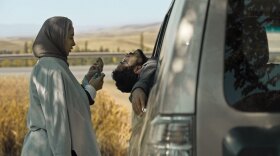In 1973, four Black men in their early 20s tried to rob a sporting goods store owned by a white man in Brooklyn. They wanted rifles, but everything went crazy and almost before anyone knew it, the four young men had taken hostages and boarded themselves up in the store. The street filled with police, news reporters and a crowd of onlookers. Early on, a policeman was killed, and one of the four men wounded.
But then things did not go as nearly everyone expected, and that chaotic time in Brooklyn gave birth to what’s now called hostage or crisis negotiations.
Hold Your Fire, directed by Stefan Forbes, gives an electric, urgent picture of both the event in 1973 and the present-day thoughts of many of the people involved. The veterans of that terrible moment are smart and reflective, and mostly humane. What emerges is the understanding that even when a situation looks clear, it probably isn’t.
No one denies these four did something dreadful. And, while in prison, the two who still survive came to understand that fully. In interviews done for the movie, now-free Shu-aib Raheem and Dawud Rahman are thoughtful and generous. But once they had entered the store and taken hostages, false assumptions took over on all sides.
Director Stefan Forbes brings together a wide range of images. There’s tons of footage taken on the street during the standoff. Uniformed cops dash from one protected spot to another, maybe hoping to shoot; the crowd grows bigger and rowdier; a huge armored vehicle rolls up, looking ready to just bulldoze the entire store, gunshots explode like sharp thunder.
These images up the tension, and the movie weaves them into the interviews, along with archival footage with comments from people on the street at the time, like the police commissioner. From these voices and pictures comes a portrait of how things developed as they did — and how they resolved and what kind of lasting effects came from it all. Of course, there’s still bitterness, sadness, and regret, but the film also uncovers real understanding.
"People think in a train of thoughts. One thought pulls the next thought pulls the next thought. I’m the thought interrupter. I told the commanders no. I’m not the person that kills other people. I want them out alive," says Harvey Schlossberg, a traffic cop turned psychologist who pioneered the idea of crisis negotiations, and who stepped into the mess and helped find a solution.
As Shu-aib Raheem explains it, he and his three friends had the dumb idea to get guns for protection, and that stupidity caused the terror and panic on all sides. They wanted to surrender early on, but believed the police would simply kill them. The police were enraged that one of their own had been killed – although it is still not known who fired the shot that killed the policemen.
Defense attorney Gerald Lefcourt, who also helped end the standoff, says that the attitude of the police — and America as a whole — is that the right side has to win and destroy the other side, and guns are the way to do it.
And it feels like forever for Harvey Schlossberg to interrupt these trains of thought, to get the police to hold their fire, to get the young men in the store to begin to communicate because, Schlossberg believed, getting any kind of conversation going can be the wedge to lower the temperature, and begin to lessen the fury and fear that drove the event.
Knowing now how things turned out does not soften the tension in the movie. Hold Your Fire whips you around from street scenes, to frenzied talk at the time, to the present-day voices of Lefcourt, Raheem, Schlossberg and Jerry Riccio, the perceptive owner of the store. It’s an illuminating experience, and it speaks to America at this very moment.






